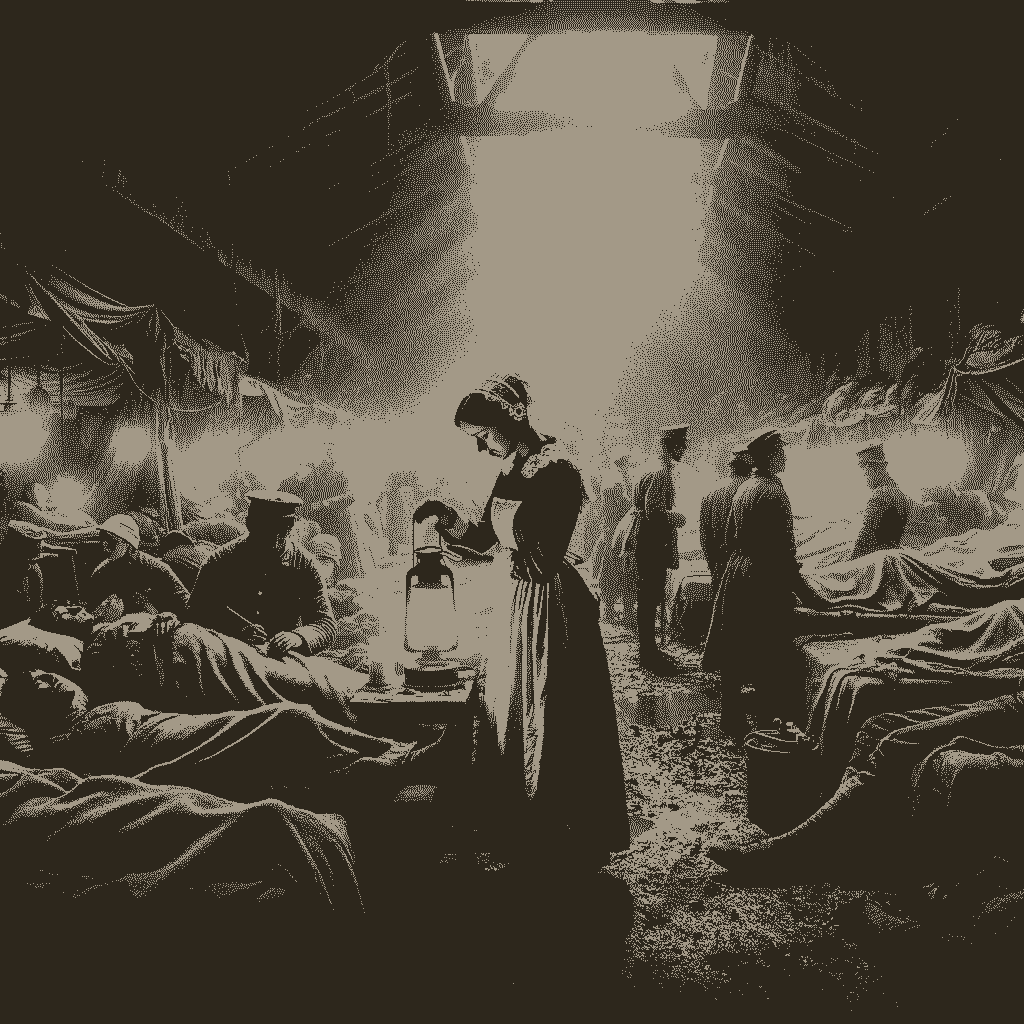Florence Nightingale was born on May 12, 1820, in Florence, Italy. Her well-to-do British parents were on a European tour at the time. Named after her birth city, Florence was the younger of two children. The Nightingales belonged to the elite social circles of Victorian England, enjoying a lifestyle of comfort and privilege. Florence’s early life was spent in the family’s estates in Derbyshire and Hampshire, where she received a thorough, albeit unusual education for a woman of her time. Her father, William Edward Nightingale, an educated and wealthy landowner, took a keen interest in her education, teaching her subjects like history, mathematics, Italian, classical literature, and philosophy.
From a young age, Florence exhibited a strong and empathetic character, often caring for ill family members and servants. She grew to be dissatisfied with the idle, purposeless life that was expected of women of her social standing. Nightingale found herself drawn to the idea of helping others, a desire that clashed with her family’s expectations, particularly her mother’s, who wished her to marry and live a traditional life.

Florence Nightingale and Nursing
The turning point in Nightingale’s life came in her early twenties, when she felt what she described as a call from God to alleviate human suffering. This divine calling, which she experienced on several occasions, set her on the path to nursing, a profession that was at the time viewed as a lowly vocation, unsuitable for a woman of her stature.
Despite her family’s objections, Nightingale pursued her calling with determination. In 1851, she defied societal norms and enrolled for nursing training at the Institution of Protestant Deaconesses in Kaiserswerth, Germany. This experience deeply influenced her, giving her not only the necessary medical training but also reinforcing her belief in the importance of holistic patient care, which included attention to sanitation, nutrition, and emotional support.
Florence Nightingale and the Crimean War
Nightingale’s work reached a defining moment during the Crimean War. In 1854, she was appointed to oversee the introduction of female nurses into the military hospitals in Turkey. Upon her arrival, Nightingale encountered appalling conditions. The hospitals were overcrowded, filthy, and lacked basic supplies. Disease was rampant, and the mortality rate was high due to infections and poor hygiene.
Undeterred, Nightingale implemented rigorous sanitation practices, dramatically improving the conditions. She worked tirelessly, often round the clock, to care for the soldiers. Her dedication during this period earned her the enduring nickname “The Lady with the Lamp,” as she often did her rounds at night.
Florence Nightingale, Statistician
Nightingale’s contributions extended beyond nursing practice. She was a talented statistician, using her skills to argue for healthcare reform. She collected, analyzed, and presented data on soldier mortality during the Crimean War, effectively demonstrating the impact of sanitary conditions on health outcomes. Her pioneering use of pie charts and statistical graphs was instrumental in persuading the government and the public of the need for reform in military and civilian hospitals.
The Call to Nursing
From an early age, Nightingale demonstrated a keen intellect and a propensity for helping others. In 1844, at the age of 24, she felt a strong calling to nursing. This was a controversial decision, as nursing was considered a profession for lower-class women and not suited for someone of her status. Despite stern opposition from her family, particularly her mother and sister, Nightingale persisted in her ambition.
Seeking formal training, Nightingale visited hospitals in London and around Europe to educate herself about healthcare and hospital management. In 1851, she defied societal expectations and undertook nursing training at the Institution of Protestant Deaconesses in Kaiserswerth, Germany. Here, she learned basic nursing skills, hospital organization, and the importance of patient care—experiences that would shape her future contributions to the field.
Statistical Innovations and Healthcare Reforms
Nightingale’s contributions extended beyond her nursing practices. A gifted statistician, she understood the power of data in effecting change. She meticulously collected data on soldier mortality and used it to advocate for healthcare reform. Her introduction of the “Nightingale Rose Diagram” visually demonstrated the impact of sanitary reforms in reducing death rates. This innovation in data presentation helped sway public opinion and policy regarding healthcare.
Establishing Modern Nursing
In the post-war period, Nightingale’s influence continued to grow. Using funds raised in recognition of her war efforts, she founded the Nightingale Training School for Nurses at St. Thomas’ Hospital in London in 1860. This institution was groundbreaking in its formalized approach to nursing education and is considered the foundation of modern nursing practice.
Nightingale also wrote extensively. Her most famous work, “Notes on Nursing: What It Is and What It Is Not” (1860), was a seminal text in the nursing field, outlining the principles of nursing care and hospital administration.
Nurses Pledge By Florence Nightingale
The Nurses’ Pledge, often associated with Florence Nightingale, is a symbolic statement of the ethics and principles of the nursing profession. While there is no direct pledge written by Nightingale herself, the modern “Nightingale Pledge” was composed in 1893 by Lystra Gretter, an American nurse, and is often recited by nursing graduates. This pledge is a modification of the Hippocratic Oath and reflects Nightingale’s values and principles. It emphasizes the commitment to personal and professional accountability, patient confidentiality, dedication to patient care, and the ongoing pursuit of knowledge in the nursing field. Here is the nurses pledge used worldwide.
Later Life and Enduring Legacy
Despite her declining health, which had been compromised during her service in Crimea, Nightingale continued her advocacy for healthcare reform and nursing education until her later years. She became increasingly reclusive due to illness, yet she remained intellectually active, corresponding with health officials and advising on public health issues.
Florence Nightingale passed away on August 13, 1910, at the age of 90. Her legacy is immense and enduring. She transformed nursing from a mostly informal, untrained occupation to a skilled and noble profession. Her emphasis on sanitation, patient care, and rigorous data usage not only saved countless lives during her lifetime but also established principles that continue to guide modern healthcare.
Florence Nightingale’s Impact on Nursing
Nightingale’s influence on the nursing profession is immeasurable. In 1860, she founded the Nightingale School of Nursing at St. Thomas’ Hospital in London, revolutionizing nursing education by combining theory and clinical practice. Her school was the first to formalize nurse education, setting a precedent that spread worldwide.

Her book, “Notes on Nursing: What It Is and What It Is Not,” published in 1859, was groundbreaking. It served as a cornerstone for modern nursing practice, emphasizing the importance of patient observation, hygiene, and the therapeutic environment. Nightingale’s focus on education, research, and evidence-based practice laid the foundation for nursing as a respected, scientifically grounded profession.
Florence Nightingale: Death and Legacy
Florence Nightingale passed away on August 13, 1910, at the age of 90. Her death marked the end of an era but the beginning of a lasting legacy. Nightingale’s work fundamentally transformed nursing, elevating it to a respected profession. She left an indelible mark on public health, hospital administration, and nursing education.
Her legacy is celebrated each year on her birthday, which is recognized as International Nurses Day. Nightingale’s contributions continue to inspire and guide nurses and healthcare professionals worldwide.
Family Ties and Spiritual Awakening
Nightingale’s family, particularly her father, played a significant role in her education and intellectual development. However, her decision to pursue nursing caused friction within her family, who had hoped she would adhere to the conventional path of marriage and domestic life.
Her spiritual life was a critical aspect of her identity. Nightingale experienced several spiritual crises and awakenings, leading her to believe that she was called by God to serve others. This deep sense of spiritual calling was at the core of her life’s work, driving her to challenge societal norms and dedicate her life to the service of the sick and poor.
In conclusion, Florence Nightingale’s journey from a privileged upbringing to becoming the pioneer of modern nursing is a testament to her unwavering commitment to improving healthcare. Her innovative approach to nursing, emphasis on sanitation and education, and her use of statistics for health reform have left a lasting impact that continues to resonate in the healthcare field today.